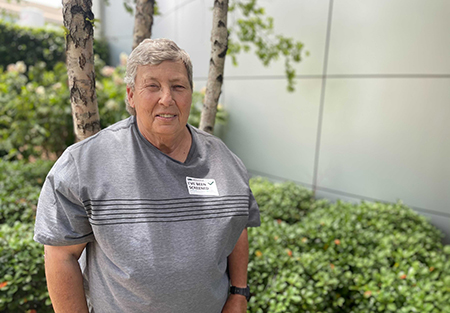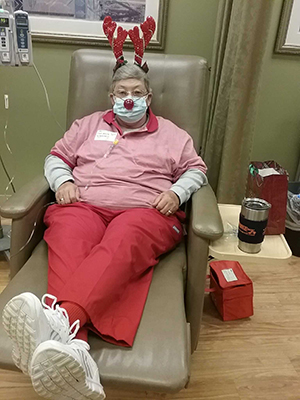Media contact: Adam Pope
 In honor of National Cancer Survivors Day, O’Neal Cancer Center patient Charlotte Patterson reflects on her own cancer diagnosis and treatment. Opelika, Alabama’s first female firefighter, Charlotte Patterson, has been putting out fires for more than 25 years. However, in May 2017, Patterson learned she would be fighting a new fire — endometrial cancer.
In honor of National Cancer Survivors Day, O’Neal Cancer Center patient Charlotte Patterson reflects on her own cancer diagnosis and treatment. Opelika, Alabama’s first female firefighter, Charlotte Patterson, has been putting out fires for more than 25 years. However, in May 2017, Patterson learned she would be fighting a new fire — endometrial cancer.
Before coming to the O’Neal Comprehensive Cancer Center at the University of Alabama at Birmingham for treatment, Patterson received a complete hysterectomy and five rounds of radiation in her hometown. Her local oncologist presumed the cancer to be gone.
However, Patterson was still experiencing immense pain and knew something was not right. A PET scan confirmed that her cancer had spread to her psoas muscle, a muscle that connects the lower back to the hip joints and is involved in various daily activities such as walking and sitting. This led her to roughly 35 additional rounds of radiation and, eventually, chemotherapy.
After just two doses of chemotherapy, Patterson began to experience a side effect called thrombocytopenia, meaning her blood platelet levels were abnormally low — too low to move forward with her existing treatment plan.
“That’s when the doctor told me there wasn’t anything else she could do for me and that, in her 15 years, she’d never seen cancer spread to a muscle, instead of an organ, like mine,” Patterson said. “My doctor talked to Dr. Leath here at UAB, and Dr. Leath said, ‘It’s very rare, but I have seen it. Get her to come up here. I think I can buy her a year.’”
Patterson decided to put her care into the hands of Charles A. Leath III, M.D., MSPH, the director of the Division of Gynecologic Oncology at UAB and a senior scientist at the O’Neal Cancer Center. After meeting Leath, Patterson promptly enrolled in a clinical trial for patients with endometrial or ovarian cancer. In an effort to extinguish the raging fire in her own body, she began traveling to and from Birmingham every other week to receive this experimental therapy.
However, this fire was not easy to put out.
“There have been a couple of times that I just wanted to throw up my hands and say, ‘I don’t want to do this anymore,’ but I think about my family more than myself and what it would do to them if I just gave up,” Patterson said. “When I was originally told they couldn’t cure me, I told my family, and that just nearly destroyed them.”
"Realistically, we were hoping that this experimental therapy would keep the tumor from growing and maybe even shrink the size of it somewhat. Little did we know that it would vanish entirely,” said Charles A. Leath III, M.D., MSPH, director of the Division of Gynecologic Oncology..
Just 13 months after enrolling in the clinical trial, Patterson would have better news to deliver to her family. On a Friday evening in August 2019, Leath called Patterson, asked her to take a seat and told her that the cancer was gone. Now Patterson is 22 months in remission and remains completely cancer-free.
“Realistically we were hoping that this experimental therapy would keep the tumor from growing and maybe even shrink the size of it somewhat,” Leath said. “Little did we know that it would vanish entirely. When I reviewed her scans and saw that the cancer was completely gone, I called her immediately. It’s always a really special moment to deliver that news to a patient, especially when there wasn’t much hope of the cancer going away.”
The O’Neal Cancer Center is one of 17 sites in the United States to offer this clinical trial to cancer patients, and Patterson is the only patient who has had a complete response to the therapeutic drug delivered in the trial. Rebecca Arend, M.D., MSPH, an associate professor in the Division of Gynecologic Oncology and associate scientist at the O’Neal Cancer Center, is the national principal investigator on the study and recently presented Patterson’s results at the Society of Gynecologic Oncology 2021 annual meeting.
 Although in remission, Patterson still travels to the O’Neal Cancer Center every other week to receive treatment in hopes of preventing the cancer from coming back. To every appointment, she totes a wagon carrying nearly 50 lunches to feed the nurses who administer potentially lifesaving treatments to cancer patients each day. Patterson says this act of service is “nothing compared to what they’ve done for me.”
Although in remission, Patterson still travels to the O’Neal Cancer Center every other week to receive treatment in hopes of preventing the cancer from coming back. To every appointment, she totes a wagon carrying nearly 50 lunches to feed the nurses who administer potentially lifesaving treatments to cancer patients each day. Patterson says this act of service is “nothing compared to what they’ve done for me.”
“Charlotte is quite a fighter and one of the strongest women I know,” said Terry Sirles, a clinical research nurse coordinator at the O’Neal Cancer Center. “Treatment has not always been an easy road to travel; but she has persevered and, today, remains disease-free. She has a huge heart and is always thinking of others by making sure we are well-fed on her treatment day. It is so rewarding to be a part of a team caring for Charlotte.”
Like Patterson, cancer survivors around the country are sharing their stories in honor of National Cancer Survivors Day 2021, a day to raise awareness of the challenges of survivorship and to celebrate life.
In partnership with the O’Neal Cancer Center, the Institute for Cancer Outcomes & Survivorship in the UAB School of Medicine seeks to design interventions and therapies to help cancer survivors not only survive, but also thrive. Learn more about the resources available to cancer survivors at UAB.